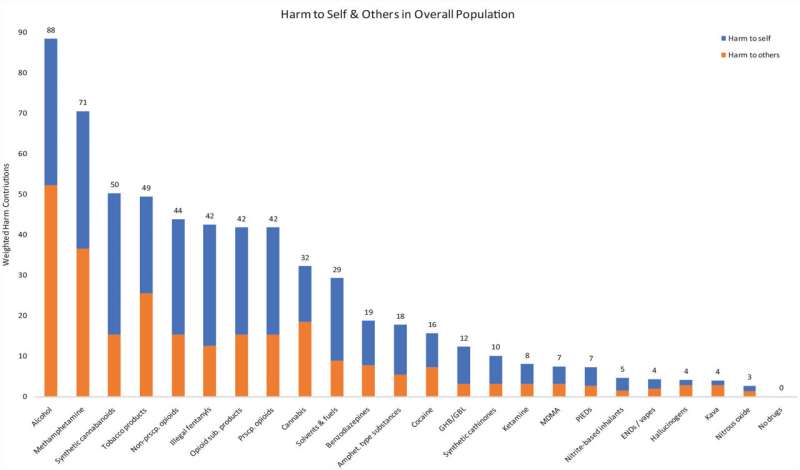This article has been reviewed according to Science X's editorial process and policies. Editors have highlighted the following attributes while ensuring the content's credibility:
fact-checked
peer-reviewed publication
trusted source
proofread
Alcohol causes more widespread harm than meth and other illegal drugs, finds New Zealand study

New University of Otago, Christchurch, research has found that a legal drug—alcohol—causes more widespread harm to New Zealand society than other illegal drugs.
Published in the Journal of Psychopharmacology, the findings show alcohol is the most harmful drug for the total population—when separately considering harm to those who use it and harm to others—followed by methamphetamine, synthetic cannabinoids and tobacco.
While other international drug harm ranking studies have examined harm in a general population, this study is believed to be the first to evaluate and rank psychoactive drugs in Aotearoa New Zealand according to harm within both the general population, and also separately for youth.
Two expert panels were established to provide data for the study, using knowledge based on their diverse expertise in medicine, psychology, justice, community services and harm reduction. Two facilitated workshops identified separate rankings of harm for (firstly) the total population, and then for youth aged between 12 and 17.
In all, 23 drugs (including legal drugs such as alcohol and tobacco) were scored against 17 different harm criteria using a swing weighting process, and analyzed with specialized Multi Criteria Decision Analysis MCDA) software. This method is used to systematically consider options and build consensus; it is a valuable method for this type of study when quantitative data are not consistently available.
Study co-author, Dr. Rose Crossin from the campus's Department of Population Health, says the findings will surprise some—who may have assumed other illegal drugs caused more harm than our most widely used legal drug.
"It might challenge people to learn this, but alcohol isn't the most harmful because it's the most widely used drug in Aotearoa New Zealand. It's rated the most harmful because of its association with a huge number of diseases, cancers, psychological disorders and other medical conditions.
"Alcohol also causes more harm to others than to those who use it, including families, friends, communities and wider society. As one example, it's associated with the likes of fetal alcohol spectrum disorder, which negatively affects a person's life, education and employment prospects. Therefore, we need to improve resourcing for interventions that reduce harm, for those who need them," says Dr. Crossin.
Aotearoa's two most widely used legal drugs, alcohol and tobacco, were found to cause the first and fourth-largest amount of harm overall.
Study co-author Professor Joe Boden, from the campus's Department of Psychological Medicine, says the results also identified a mismatch between harmfulness and legal status.
"We found a spread of harmfulness among a number of illegal Class A drugs, with some causing a lot of harm, and others very little. In some cases, the criminal penalties for using these drugs don't match the level of societal harm they actually cause," says Professor Boden.
New Zealand's drug policies are also causing harm, the study authors say.
"Our study has identified that a significant proportion of drug harm arises from the legal status of the drug, rather from the drug itself. This includes harms to the drug user such as loss of employment and relationships, along with harms to others relating to crime and family adversities. This suggests we need to reconsider our policy settings to reduce overall drug harm, and consider how best to support family, friends and communities—not just the actual individual using the drug," Professor Boden says.
NZ Drug Foundation Executive Director Sarah Helm says that the new research is extremely valuable, especially as it focuses on the New Zealand population.
"When you rank drugs by harm, the evidence supporting drug law reform is compelling. This research makes clear that there's no relationship between legality and lower harm, in fact our laws are causing a lot of the harm. We need to shift towards regulation of substances based on the actual harm they cause."
More information: Rose Crossin et al, The New Zealand drug harms ranking study: A multi-criteria decision analysis, Journal of Psychopharmacology (2023). DOI: 10.1177/02698811231182012




















